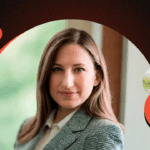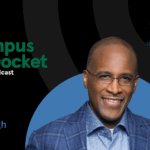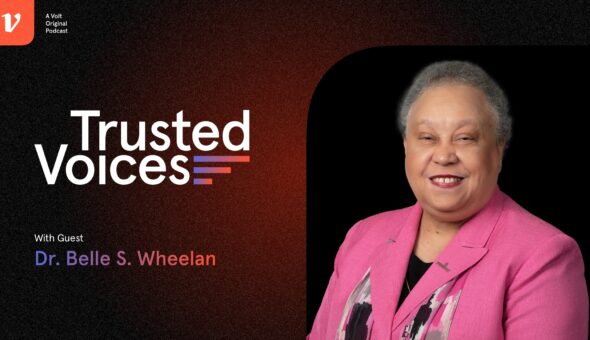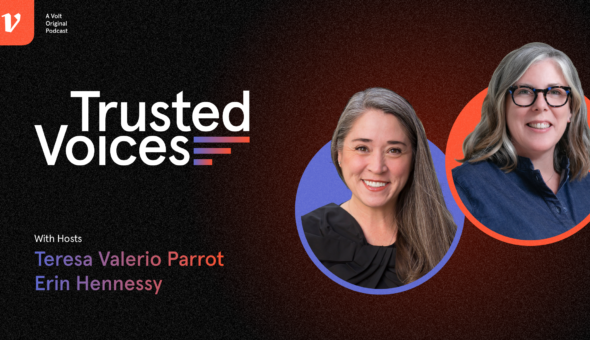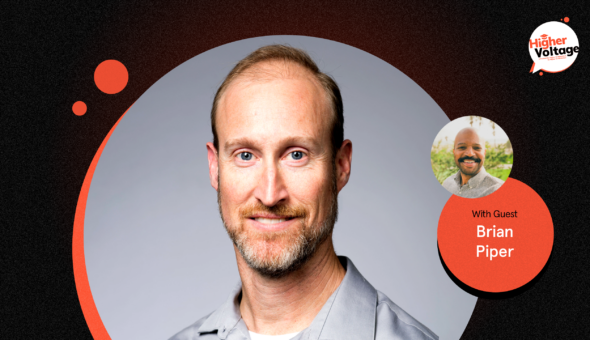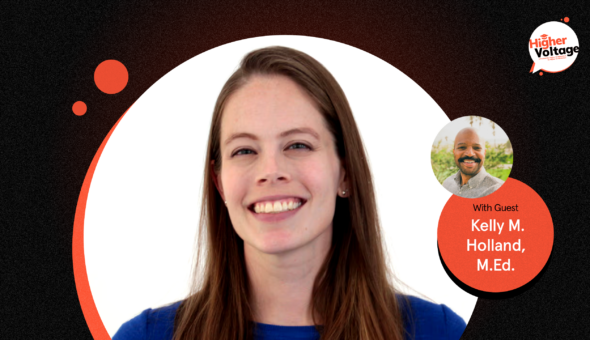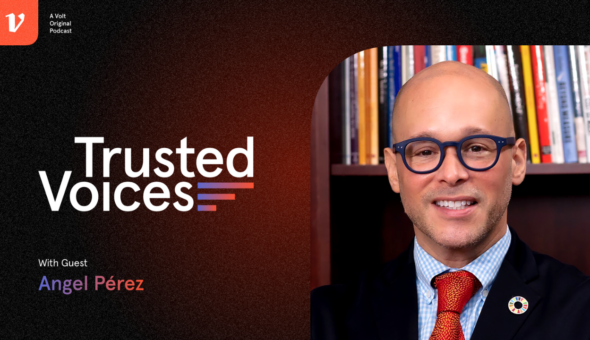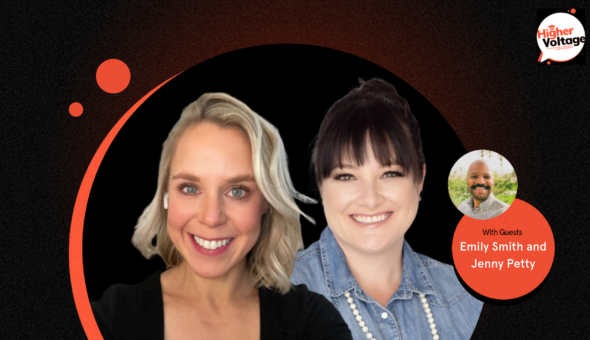The inaugural season of Trusted Voices covered a lot of ground, full of unguarded conversations and actionable insights as we explored the intersection of higher ed leadership and communications.
In the final episode of our first season, Teresa and Erin look back on the first season’s line-up of guests and reflect on what each brought to the podcast and the common threads that showed up in each conversation, including the value of authenticity and accountability, and why it is important to let leaders lead and communicators do their jobs.
Along the way they share their summer reading lists, their predictions for upcoming changes to higher ed and what they hope to accomplish in Season 2 this fall.
Thank you to our Season 1 guests: Vince Rougeau, president of College of the Holy Cross; Eric Hoover, senior writer at the Chronicle of Higher Education; Amy Privette Perko, CEO of the Knight Commission; and Valerie Sheares-Ashby, president of the University of Maryland-Baltimore County.
- Episode 1A: Vincent Rougeau on Leadership, Change, and His Career of Many Firsts
- Episode 2A: Eric Hoover on Student Experiences and Higher Ed’s Trust Issues
- Episode 3A: Amy Privette Perko on the NCAA, NIL, and Today’s Student-Athlete Experience
- Episode 4A: Valerie Sheares Ashby on Mentorship, Team Building and Measures of Success
- Clarence Thomas Was a Beneficiary of Race-Based Admissions at My School
- On Lies and the Truths We Must Tell
- The Righteous Mind: Why Good People are Divided by Politics and Religion
- Wild Problems: A Guide to the Decisions that Define Us
- The Coddling of the American Mind: How Good Intentions and Bad Ideas Are Setting Up a Generation for Failure
- High Conflict: Why We Get Trapped and How We Get Out
- Win Every Argument: The Art of Debating, Persuading, and Public Speaking
- Saving Time: Discover a Life Beyond the Clock
- The Practice of Groundedness: A Transformative Path to Success that Feeds – Not Crushes – Your Soul
Read the full transcript
Teresa Valerio Parrot:
Hello and welcome to Trusted Voices podcast. I’m Teresa Valerio Parrot alongside Erin Hennessy. And in each episode we’ve discussed the latest news and biggest issues facing higher education leaders through a communications lens. For those conversations, we’re normally joined by a guest who shares their own experiences and perspective. This week we’re closing out our first season and Erin and I are going to recap our conversations and talk a little bit more about what we thought, what our impressions are, and we’re also going to talk a little bit about summer, and that includes both what we think is going to be impacting higher education, what leadership might be focused on. We’ll talk a bit about what we’re reading because we always love to read and preview what’s in store for Season 2 of Trusted Voices. So with that, Erin, do you want to give a quick recap of who we had on in Season 1?
Erin Hennessy:
Yeah, absolutely. Looking back at this list, it’s probably impolite to say that I’m rather impressed with ourselves. For the first season of this effort, we started out with Vince Rougeau, who’s the president of the College of the Holy Cross in Worcester, Mass. We then shifted over to talk with Eric Hoover, senior writer at the Chronicle of Higher Ed. We chatted with Amy Perko of the Knight Commission on Intercollegiate Athletics, and we closed out this series with one of the most inspirational conversations I think either of us have had in the last couple of months with Valerie Sheares Ashby, the president of the University of Maryland, Baltimore County. What I think was really interesting about all four of those conversations were the themes and the threads that just kept coming up over and over in each of those episodes. Teresa, which of those themes really jump out to you?
Teresa Valerio Parrot:
I think there’s always this topic about the value of higher education, and we’ve covered that quite a bit. And the second topic that really hit home was the continuation of us talking about the differentiation between leadership and communications issues, what each needs. I think our four trusted voices did a fantastic job of making the case for leaders to be leaders and allowing communicators to do their jobs of sharing what decisions have been made and direction has been charted. I really appreciated how we’ve bounced between the two of those because I think value and leadership are so connected right now in higher education. Erin, how about for you?
Erin Hennessy:
I agree, and I think certainly looking at the conversations we had with the two sitting presidents, President Rougeau and President Sheares Ashby, one of the things that I think we sort of talked about behind the scenes and after the fact was the way in which they both were comfortable answering questions and also comfortable in not answering some questions and doing it in a way that wasn’t spinning or covering, but simply answering the things that were relevant and connected to the work they do and the way that they approach leadership and stepping away from those questions that either were outside their realm of expertise, were outside their focus for their institutions. I think you and I encounter presidents all the time, and I’m guessing one of our other guests, Eric Hoover would agree with this. We encounter folks all the time who just decline to have a conversation because they are nervous about where it’s going to go or what questions are going to come up or the positions they may be put in if they give a transparent and accurate and truthful answer to some of those questions.
You and I both know when we talk with people that we media train and leaders that we counsel all the time that there are ways to have conversations and to reframe questions or to refer people to other outside expertise when there is a question that you can’t or don’t want to answer. But it is really hard to create a leadership profile and lead an institution if you decline to have a conversation because you’re nervous about where it will go. And neither of the presidents we talked to this season come anywhere close to that avoidance of what could be difficult or challenging conversations.
Teresa Valerio Parrot:
Agreed. And I think the nice thing, and it’s a pivot to our other two trusted voices is, as you mentioned, each of them was willing to say, “This is what I know, and this is outside of my area of expertise.” So part of our rationale for having Eric Hoover and Amy Perko on is they are some of those content experts, although I’m sure Eric would say that he covers those who are the content experts. As we saw in that episode, he himself is a content expert. What I would say for Amy is she was able to make such a really complex topic, intercollegiate athletics in today’s landscape, very understandable. The feedback I got from both the Eric and Amy episodes is that people learned new ways to talk about very complex topics, and I think it’s important for us to continue to have those kind of experts join what we know to round out our expertise.
The other thing that I would note, and this goes back to both Vince and to Valerie, is that the feedback that I received was so positive from people who wanted to hear from inspirational leaders, and that’s exactly what both of them brought so beautifully to the conversation.
Erin Hennessy:
Yeah. I know at some point we have to let go of the burnout and post Covid, or not let go of it, but stop talking about it and actually address it. I feel like I got a lot of those same comments about how inspirational those conversations were. I think it just speaks to where so many people in our industry still are, still coming out of that post covid trauma, I think we have to call it trauma, and still figuring out how to reconnect in a meaningful way with the work they are doing, in a sustainable way with the work that they are doing and are really looking to leadership for inspiration and perhaps not finding it on their campus. But I’m thrilled that they found it in these conversations.
Teresa Valerio Parrot:
I agree. And I think there was such an authenticity to how they presented their opinions, their ideas, and there was also resolve in their positions. “This is my job, this is what I do.” We talk about accountability and responsibility, and both of them were willing to step up on what that means for their positions, and there’s something that I think is just so important about those traits.
Erin Hennessy:
Agreed. One of the other threads that kept coming back for me and partially because we brought it up in every conversation, but I think we have to, it’s still such an enormous cloud hanging over our industry are those paired questions about value and about trust. We continue to see there’s constantly polling about how little trust people have in small I institutions, and we’re not immune to that. In fact, I think we may be more scrutinized now for a variety of reasons, but we continue to bemoan our inability to communicate in a meaningful way with people about value in a way that drives trust. I think it’s another one of those conversations where we have to stop admiring the problem and actually start doing something about it.
I feel like every couple of years we have a conversation at the association level where folks say, “Well, we’re going to do an ad council campaign, or we’re going to collect stories of wonderful things happening on our campuses.” And at this point in time, the audience that we are attempting to move and to communicate to is far too savvy, I think, for those kinds of efforts to fix the problem or the problem is bigger than those very small and tactical kind of efforts can address.
So I think that’s something that’ll continue to come up in Season 2. I’m really interested in finding some new voices to help tackle those questions in those conversations. Because I think part of the problem, and you and I talk about this all the time, part of the problem is it’s the same people asking the question and attempting to answer it. We’re not moving the needle with only those voices in play.
Teresa Valerio Parrot:
I would also say, I think that there are some significant tensions that we have in the industry that people just don’t want to address because they make us uncomfortable. If I think about what Vince has been doing since he was on our podcast, he had a piece that was in the Boston Globe recently, and he talked about how Supreme Court Justice Clarence Thomas benefited from affirmative action at College of the Holy Cross, which is where President Rougeau is president, and how that had to have influenced where he is now and some of the opinions that he has.
I know other presidents would have shied away from a conversation about an alum who holds an important role, who may be making a really tough decision coming up, and he tackled it because it’s an elephant in the room. And I think that’s the kind of leadership that we have now had on the podcast. You and I, as we think about who we will have next, that is at the top of our list. Who will talk about the topics that need to be discussed and address the tensions that we all know exist but aren’t comfortable? And that’s what leadership is.
Erin Hennessy:
Yeah. We’ll add a link to that piece by President Rougeau to the show notes. It also makes me think of several years ago during the Trump administration when Pat McGuire, the President of Trinity Washington, wrote a piece about higher education and truth and the meaning of truth and took to task Kellyanne Conway, who was a Trinity Washington alumni and probably one of the more prominent at that moment or most public facing alumni of the college. I think a lot of people probably told her she shouldn’t and I think a lot of people probably told her she should have swung harder. But I think those kinds of pieces are very brave, and I think they both work because they are tied directly to the mission and to the work that the institution is doing and what the institution and our industry writ large stands for. I think that’s why those pieces worked. We’ll also find the link to that Pat McGuire piece and include that in the show notes as well.
Teresa Valerio Parrot:
I think with that conversation, it really pivots, to be honest, to two of the things that we also want to discuss. One is, what do we see coming up this summer? What are the issues that we’re tracking? And the second is what are we reading? For me, the Supreme Court decision on affirmative action has to be what we all are working on this summer. I was very fortunate enough to be on a webinar for a case, and it was with the president of NACAC and also with a lawyer who works with a number of associations in DC. And we talked about this and we talked about how this decision and the majority opinion are going to give us recommendations that we are going to need to implement. And we’re going to have to audit everything from our strategic plans to the language that we use for marketing, to the ways in which we reach out to prospective students. This isn’t just an enrollment management topic or issue. This is going to be more fundamental to how we talk about the industry and what we value.
Erin Hennessy:
Agreed. In addition to watching SCOTUS blog very closely, I’ll be there. We’re recording this in late June. I’ll be there tomorrow morning at 10:00 AM to see what comes out of the SCOTUS press room. But in addition to the affirmative action case, which is certainly taking up a lot of mental real estate for all of us, we’ll also expect to see a decision on student loan forgiveness. I feel like our institutions have tried to sort of put that at arm’s length in some ways. I think, if as expected, that student loan forgiveness program is overturned or curtailed by the Supreme Court, talking about that trust question, we’re going to see a lot more pushback on costs. We’re going to see a lot more pushback on indebtedness. We’re going to see a lot more pushback on time to degree and just a lot more questions about how we do what we do and how we ask people to pay for it, and how we continue to seemingly ask evermore dollars from our students and our families as they consider post-secondary education and move through our institutions.
Teresa Valerio Parrot:
I appreciate exactly how you just described that. I think there is this thread that runs across a number of different topics, and that is this political divide that we have and how higher education finds itself in the crosshairs of a number of partisan discussions. I think that that is increasing, and I will quote you to you because we had a conversation about this last week and I liked how you framed it, and that is, “Higher education has always been political, but now we are saying the uncomfortable and difficult things out loud.” Those things that we would only say behind closed doors on all political viewpoints are now being shared publicly.
And for that reason, I am spending the summer reading a couple of books to think about how to frame what we say and how we say it. We use so much psychology in our work. For that reason, I’m hoping to get a vantage point on how to consider different opinions and also how to think about partnering with others. I have three books to share. The first is The Righteous Mind: Why Good People Are Divided by Politics and Religion by Jonathan Haidt. The second is Wild Problems: A Guide to the Decisions That Define Us by Russ Roberts. And then my third book is The Coddling of The American Mind: How Good Intentions and Bad Ideas are Setting Up a Generation For Failure, and that book is by Greg Lukianoff and Jonathan Haidt as well. So maybe at the end of the summer, I’ll tell you what I read and what I am thinking, but really I’m trying to get a vantage point into how others are discussing these topics.
Erin Hennessy:
I have a stack of novels, which I’m much more excited to read than a number of the other things that are on my pile. But interestingly sort of connected with, and we have not compared these lists previously, but connected with your concept of division and conflict. I have on my pile and have for a while, so I’m going to prioritize it this summer, a book by Amanda Ripley called High Conflict: Why We Get Trapped and How We Get Out, which is about how we sort of demonize the other side and the conflict becomes more important almost than the issues over which we are in conflict. That I’m really excited to read. There were a couple of excerpts that appeared when that book was first published that were really, really intriguing. So I’ll spend some time with that this summer.
I also picked up a book as a stubborn sort of argumentative person. I have to pick up a book called Win Every Argument, which is written by Mehdi Hasan. He is a broadcaster. You’ve probably seen him on MSNBC. He has a show there, and it talks about the art of debate, which he argues we have lost. We just sort of go into an argument and shut down. This is really focused on persuasion and public speaking.
Then the other book that is on my pile doesn’t connect to any of these topics, but really connects to the concept of work and the concept of time, which you and I have spent a lot of time talking about over the last year, year and a half. Some of that conversation has resulted in different approaches for us to our work, both as an agency, but you and I have talked about holding each other accountable around, I wouldn’t say balancing work and life, but finding a balance point. So the book that is on my pile is called Saving Time, which is written by Jenny Odell. She wrote a book a couple years ago called How to Do Nothing, which really looked at how these little supercomputers in our pockets and other things have driven us to constantly be taking in information or taking in distractions.
Teresa Valerio Parrot:
Yes.
Erin Hennessy:
This book is really about how time has been weaponized and how to release yourself from the pressures and beliefs that have been impressed on us by society about how we use our time and how we have to be productive. I’m interested in digging into all of those in addition to my huge pile of novels and other things that I’m hoping to get to this summer.
Teresa Valerio Parrot:
The last book that you mentioned, it actually reminds me of a book that Jenny Petty created a book club to talk about, and we actually had the author come and speak with us, and it’s The Practice of Groundedness: A Transformative Path to Success that Feeds – Not Crushes – Your Soul. And he covered some of those topics as well, Brad Stulberg did. I just thought it was a nice reminder to stop and take a look around and think about where you spend your time tells what you prioritize. I think that’s a really important point for all of us this summer, especially as hopefully we get a chance to take some vacations and some time off.
Erin Hennessy:
Yes, please. I love that you mentioned the Book Club because that is something that you and I have tossed around and thought about doing.
Teresa Valerio Parrot:
Yes.
Erin Hennessy:
So we’re going to spend some time thinking about that this summer as well as booking guests for Season 2. And so stay tuned if you are readers like we are, because we’re always looking for an excuse to read on work time, and we may have some opportunities to do some reading and share some feedback together as a group in the fall.
Teresa Valerio Parrot:
I think this is really an opportunity for us to say, we’ve said this in I think all of our episodes, and if not, we intended to, and that is that we want feedback. We want to hear from people. We did get so much great feedback on our guests this season, and we would encourage more, including do you want to be in a book club with us? We’ve created an email address to collect some of that information. And the email address is TrustedVoices@TVPCommunications.com, and we’ll make sure we put that in the show notes. But we would love to hear anything that you want to share, anything that you’re thinking, and let us know if we’re missing any books that we really should be reading as well.
Erin Hennessy:
And on that note, I think it’s time to wrap up this episode and wrap up Season 1. We want to say thank you so very sincerely to our listeners for spending time with us and most importantly with our guests this season. We hope that you feel these conversations have been informative and maybe even a little inspirational. If you have missed any episodes this season, we encourage you to scroll back in your feed and listen to those conversations as well as the conversations where Teresa and I talk about our takeaways from our guests and their perspectives.
As Teresa said, we’d love to hear from you over the summer about other topics that interest you, feedback you have about the podcast or dream guests you’d love to hear from in coming seasons. You can reach us at TrustedVoices@TVPCommunications.com, and as Teresa said, we’ll include that email address in this episode’s show notes. We will be back in your feed this fall to continue our conversations at the intersection of leadership and communications in higher education. In the meantime, we wish you a productive and restorative summer. And once again, thank you to Teresa Valerio Parrot, DJ House Child, Aaron Stern, Nicole Reed, and the Volt team for a great episode and a great season. And thank you for listening.
